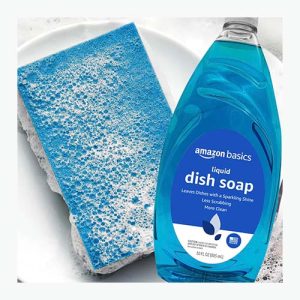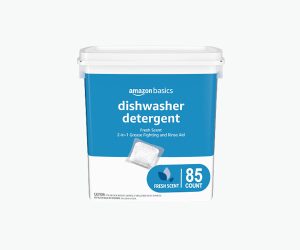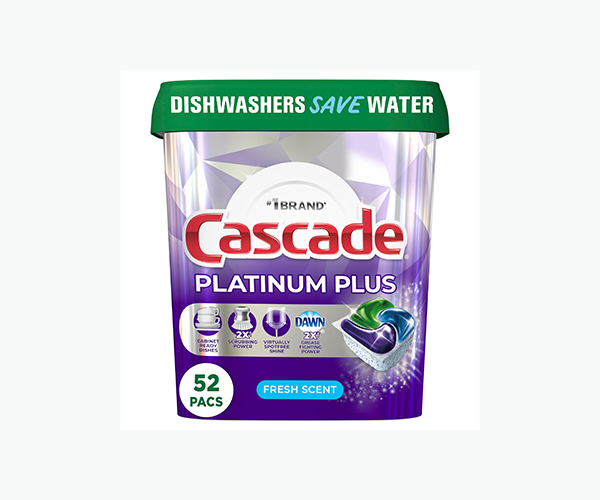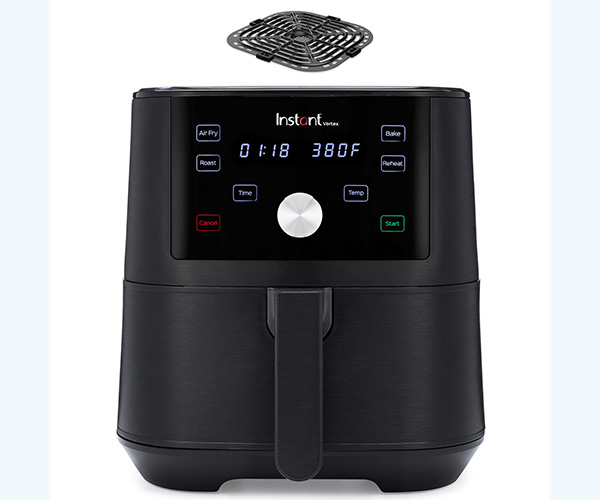Introduction of Cheap Dishwasher Detergents
On a normal Tuesday night, I was standing in front of my neighborhood supermarket’s seemingly endless aisle of dishwasher detergents. I saw a discount brand that was far less expensive than its competitors. I threw it into my basket, not realizing the trip it would lead me on, hoping to save a few bucks. I had always thought that dishwasher detergents were all the same and that price was the only thing that separated them, like many other people do. But this seemingly harmless decision helped me learn about the realities and hidden dangers associated with inexpensive dishwasher detergents. We dive into the world of dishwasher detergents in this in-depth analysis, looking at the appeal of less expensive solutions as well as the possible consequences they may impose on our health, our appliances, and the environment in addition to our wallets. Come along as we uncover the truth about these commonplace items and discover how to make decisions that are genuinely clean in every sense of the word.
Understanding Dishwasher Detergents
Dishwasher detergents are sophisticated mixtures made to meet a range of cleaning needs in your dishwasher; they are not just soap. Selecting the ideal dishwashing detergent for your needs requires an understanding of their function and the several varieties that are available. Let’s take a closer look:
- Role of Dishwasher Detergents:
- Cleaning: The primary role of any dishwasher detergent is to clean dishes effectively. This includes removing food residues, stains, and ensuring dishes come out spotless.
- Sanitizing: Beyond cleaning, detergents also sanitize dishes, eliminating bacteria and other pathogens that might be present due to food residues.
- Water Softening: In areas with hard water, detergents play a crucial role in softening water to prevent mineral buildup on dishes and inside the dishwasher.
- Types of Dishwasher Detergents:
- Powder Detergents: These are traditional detergents and are known for their affordability and effectiveness in cleaning heavily soiled dishes.
- Liquid Detergents: Liquid detergents are less abrasive than powders and are ideal for delicate dishes and glassware. However, they might not be as effective on hard stains.
- Tablet or Pod Detergents: These have gained popularity for their convenience and pre-measured doses. They often combine detergent with rinse aids and other cleaning agents.
- Eco-Friendly Detergents: These are formulated with biodegradable, plant-based ingredients and are free from harsh chemicals. They are an excellent choice for environmentally conscious consumers.
- Choosing the Best Dishwasher Detergent:
- Effectiveness: The best detergent should effectively clean and sanitize dishes without leaving any residues.
- Compatibility with Dishwasher: Some detergents are specifically formulated for certain types of dishwashers and water hardness levels.
- Environmental Impact: Eco-friendly detergents are better for the environment and often safer for household use.
- Cost: While cost is a factor, it’s important to balance it with effectiveness and environmental impact.
- Ingredients to Avoid:
- Phosphates: Once common in detergents, phosphates can cause environmental harm but are now banned or reduced in many regions.
- Chlorine: Used for its sanitizing properties, chlorine can be harsh on dishes and is a concern for indoor air quality.
- Artificial Fragrances and Dyes: These can cause allergic reactions and are unnecessary for the cleaning process.
- The Importance of Quality:
- Long-Term Appliance Care: High-quality detergents can prolong the life of your dishwasher by preventing buildup and ensuring efficient cleaning cycles.
- Health Considerations: Detergents with fewer harsh chemicals are better for your health, especially for those with skin sensitivities or allergies.
In conclusion, choosing the finest dishwasher detergent for your home requires an understanding of the functions and varieties of dishwashing detergents. It’s not just about cost; it’s also about efficiency, the influence on the environment, and the longevity and well-being of your family and appliances. The need of eco-friendly and effective cleaning products in our daily life is growing as time goes on.

The Allure of Cheap Dishwasher Detergents
The instant allure of less expensive options tempts many shoppers in their search for the best dishwasher detergent. This attraction has a variety of causes that are worth investigating:
- Cost-Effectiveness: The most obvious allure is the price. In a world where household budgets are continually stretched, saving a few dollars on a detergent can seem like a wise financial decision.
- Affordability: For families on a tight budget, the lower price point of these detergents is undeniably attractive.
- Perceived Value: There’s a common misconception that all detergents perform similarly, leading consumers to opt for the cheaper option.
- Availability and Convenience: Cheap detergents are readily available in most stores, making them an easy grab-and-go option.
- Ubiquity: These products are often prominently displayed in stores, catching the eye of shoppers.
- Ease of Purchase: The convenience of picking up a detergent along with other groceries is a significant factor.
- Marketing and Branding: Aggressive marketing strategies and attractive packaging play a crucial role in influencing consumer choices.
- Promotional Offers: Sales and discounts on these products make them even more appealing.
- Brand Recognition: Some budget brands are well-known, creating a sense of trust and familiarity.
- Lack of Awareness: Many consumers are not fully aware of the differences in detergent quality and the potential risks associated with cheaper options.
- Knowledge Gap: There’s often a lack of understanding about what makes a detergent effective or safe.
- Underestimating Impact: The long-term effects on dishwashers and health are frequently overlooked.
This first charm, though, can be deceiving. These inexpensive detergents come with hazards and hidden expenses that frequently outweigh the immediate savings. The best dishwasher detergent is not only about cost, as we will see when we go deeper into the chemical makeup and its effects on health and appliance performance. It involves realizing how to strike a balance between cost, efficacy, and safety. We will learn the real story behind these detergents’ chemicals, how they affect our dishwashers, and the wider effects they have on the environment and human health in the parts that follow.
Chemical Composition of Cheap Detergents
It’s important to comprehend the chemical composition of dishwashing detergents, particularly the less expensive ones, while considering what makes our greatest dishwasher detergent. These detergents’ cheaper price is frequently accompanied with a hidden cost that results from their chemical makeup. The common ingredients present in less expensive dishwasher detergents are broken down below, along with any possible dangers.
- Phosphates:
- Role: Enhance cleaning efficiency by softening water and breaking down grease.
- Risks: Environmental hazard; contribute to algae blooms in water bodies, leading to ecological imbalances.
- Chlorine Bleach:
- Role: Used for its strong disinfectant properties and to remove tough stains.
- Risks: Can form toxic compounds when mixed with other substances; respiratory irritant and potential health hazard.
- Synthetic Fragrances:
- Role: Added for a pleasant scent.
- Risks: Often contain phthalates, which are endocrine disruptors; can cause allergic reactions and long-term health issues.
- Triclosan:
- Role: Antibacterial agent.
- Risks: Linked to hormone disruption and the development of antibiotic-resistant bacteria; banned in some regions due to its environmental impact.
- Sodium Lauryl Sulfate (SLS) and Sodium Laureth Sulfate (SLES):
- Role: Surfactants that create lather and remove dirt and oil.
- Risks: Skin irritants; SLES can be contaminated with 1,4-dioxane, a possible human carcinogen.
- Formaldehyde:
- Role: Preservative.
- Risks: Known carcinogen; can cause respiratory issues and skin irritation.
- Ammonia:
- Role: Enhances cleaning power.
- Risks: Can cause irritation to the skin, eyes, and respiratory system; dangerous when mixed with bleach.
- Dyes and Colorants:
- Role: Used for aesthetic purposes to make detergents visually appealing.
- Risks: Some dyes are allergens and can be toxic.
Selecting the finest dishwasher detergent requires an understanding of these factors. With less expensive solutions, the cleaning outcomes can look good right away, but the long-term repercussions on the environment and human health are alarming. Despite their effectiveness in eliminating dirt and food particles, these chemicals may leave behind residues that our skin and food may come into contact with. Furthermore, they have a large negative influence on the environment, especially when it comes to water contamination and harm to aquatic life.
We’ll look at how these chemicals impact not just our health but also the functionality and lifespan of our dishwashers in the upcoming sections. We’ll also talk about less dangerous substitutes that clean well without having these negative side effects. It’s critical for us as customers to understand what goes into our appliances and, eventually, into our houses. The finest dishwashing detergent should include environmental and public health in addition to cleaning effectiveness.
Impact on Dishwasher Performance and Longevity
The type of detergent we use is crucial to preserving the performance and prolonging the life of our dishwashers. Remarkably, the appeal of using less expensive detergents to save a few bucks might have expensive repercussions. Let’s examine how the longevity and functionality of our dishwashers are affected by the best dishwasher detergent options:
- Effect on Cleaning Efficiency:
- Inferior Cleaning: Cheaper detergents often struggle to effectively remove tough stains and grease, leading to repeated wash cycles.
- Residue Buildup: They can leave behind residues, which not only affects the cleanliness of the dishes but also accumulates in the dishwasher’s internal components.
- Wear and Tear on Dishwasher Components:
- Corrosive Chemicals: Many low-cost detergents contain harsh chemicals that can corrode dishwasher parts over time.
- Damage to Seals and Hoses: The aggressive nature of these chemicals can lead to the deterioration of essential parts like rubber seals and hoses, resulting in leaks and mechanical failures.
- Impact on Energy and Water Usage:
- Increased Consumption: Due to their inefficiency in cleaning, there’s often a need for additional wash cycles, which in turn increases energy and water usage.
- Long-Term Cost Implications: The initial savings from purchasing cheaper detergents are overshadowed by the increased utility bills and potential repair costs.
- Comparison with Higher-Quality Detergents:
- Enhanced Cleaning Capabilities: Higher-quality detergents, often labeled as the best dishwasher detergents, are more effective in cleaning and require fewer wash cycles.
- Gentle on Dishwasher Parts: They are formulated to be gentler on the dishwasher’s components, reducing the risk of damage and extending the appliance’s lifespan.
- The False Economy of Cheap Detergents:
- Short-Term Savings vs. Long-Term Costs: The initial lower cost of cheap detergents is a false economy when considering the long-term expenses related to appliance repairs and inefficiencies.
- Investment in Quality: Investing in the best dishwasher detergent is not only an investment in cleaner dishes but also in the health and longevity of your dishwasher.
In conclusion, it’s important to take into account the wider impact on your dishwasher’s performance and lifespan, even though it’s natural to be tempted to save money by using less expensive dishwasher detergents. Although the best dishwashing detergents are more expensive, they guarantee thorough cleaning while being kind to your appliance because of their more balanced approach. This helps you save money overall by preventing damage to your dishwasher and lowering your utility and repair expenses. Choosing the appropriate detergent with knowledge is a crucial first step in maintaining your household appliances responsibly.

Health Risks and Safety Concerns
It’s important to take into account potential health dangers and safety issues in addition to cleaning effectiveness when choosing the best dishwasher detergent. Here, we explore the lesser-known risks that some of the less expensive detergent alternatives may be hiding:
- Chemical Exposure:
- Many low-cost detergents contain harsh chemicals like phosphates, chlorine, and synthetic fragrances.
- Prolonged exposure to these substances can lead to skin irritations, allergic reactions, and in severe cases, respiratory issues.
- The residue left on dishes can potentially contaminate food, leading to ingestion of these harmful chemicals.
- Environmental Toxins:
- Ingredients like phosphates, while effective in cleaning, are detrimental to aquatic life. They contribute to algae blooms that deplete oxygen in water bodies, harming marine ecosystems.
- The use of non-biodegradable chemicals means they persist in the environment long after they’ve gone down the drain.
- Impact on Indoor Air Quality:
- Volatile Organic Compounds (VOCs) found in some detergents can evaporate during the dishwashing cycle, reducing indoor air quality.
- These VOCs are linked to various health issues, including headaches, nausea, and aggravation of respiratory conditions.
- Safety Standards and Regulations:
- Not all detergents are created equal, and cheaper options often skimp on safety standards.
- It’s essential to look for detergents that meet safety regulations and are transparent about their ingredient list.
- Long-Term Health Concerns:
- Continuous exposure to harmful chemicals in detergents can have long-term health implications.
- Studies have shown a correlation between certain chemical exposures and chronic health conditions, including hormonal disruptions and increased cancer risk.
- Children and Sensitive Groups:
- Young children, pregnant women, and individuals with pre-existing health conditions are more susceptible to the adverse effects of toxic chemicals.
- Choosing a detergent that is free from harsh chemicals is especially important for households with these sensitive groups.
In conclusion, even while it may seem appealing to save a few bucks by switching to a less expensive detergent, it is important to consider the possible health and safety implications. It’s critical for us as customers to exercise caution and knowledge, choosing cleaning products that are safe for the environment and our health in addition to being highly effective at cleaning. Finding the finest dishwasher detergent should involve striking a balance between environmental responsibility, safety, and efficacy to make sure that the products we choose improve both the world and our well-being.
Environmental Impact
Although they are sometimes disregarded, the environmental effects of utilizing inexpensive dishwasher detergents are vital to comprehending the complete picture of our decisions. It’s critical to take the environment into account as we work toward cleaner dishes. Here, we examine these detergents’ environmental impact and stress the significance of selecting environmentally suitable substitutes.
- Chemical Runoff and Water Pollution:
- Many cheap dishwasher detergents contain phosphates and other harsh chemicals. When these detergents are rinsed away, they can end up in waterways, contributing to water pollution.
- Phosphates, in particular, can lead to algal blooms, which deplete oxygen in water bodies, harming aquatic life.
- Non-Biodegradable Ingredients:
- Unlike some of the best dishwasher detergents that focus on biodegradability, cheaper options often contain ingredients that do not break down easily in the environment.
- This leads to long-term accumulation and potential harm to wildlife and ecosystems.
- Plastic Packaging:
- The packaging of these detergents is another environmental concern. Cheap detergents often come in non-recyclable plastic containers, contributing to the growing problem of plastic waste.
- Opting for detergents with recyclable or biodegradable packaging can significantly reduce your environmental footprint.
- Energy and Resource Consumption in Production:
- The production process of cheap detergents can be resource-intensive, utilizing significant amounts of water and energy.
- In contrast, many eco-friendly brands prioritize sustainable production methods, reducing overall resource consumption.
- Impact on Soil and Plant Life:
- Residues from these detergents can accumulate in the soil, affecting its quality and the health of plant life.
- Chemicals leaching into the soil can alter its pH and nutrient balance, negatively impacting agriculture and natural vegetation.
- Air Quality Concerns:
- Volatile organic compounds (VOCs) found in some detergents can evaporate into the air, contributing to indoor air pollution.
- These compounds can have adverse effects on air quality and may pose health risks to humans and animals.
- The Role of Consumers in Environmental Protection:
- As consumers, choosing the best dishwasher detergent isn’t just about clean dishes; it’s also about making environmentally responsible choices.
- By selecting detergents that are eco-friendly, we can collectively reduce the negative impact on our planet.
- The Shift Towards Eco-Friendly Detergents:
- There is a growing trend towards environmentally friendly dishwasher detergents, with many brands now offering phosphate-free, biodegradable options.
- These detergents are designed to provide effective cleaning while minimizing environmental harm.
To sum up, dishwasher detergents have an effect on the ecosystem that goes far beyond our kitchen sinks. Making educated decisions and being aware of these effects can help us make the world a healthier place. The transition to more environmentally friendly solutions is essential to live a sustainable lifestyle, not merely a passing fad. In order to ensure that our pursuit of clean dishes does not compromise the health of our planet, it is up to us as consumers to effect change by selecting goods that are consistent with our environmental beliefs.
Cost Analysis: Short-Term Savings vs. Long-Term Costs
Many of us are tempted to choose less expensive solutions since they provide instant cost savings when searching for the finest dishwasher detergent. A closer examination of these detergents’ economics, however, tells a different tale. Let’s dissect the cost analysis, taking into account both immediate and long-term expenses:
- Initial Cost Savings:
- Cheap detergents often boast lower upfront costs, making them attractive for budget-conscious shoppers.
- The price per wash can be significantly less when compared to premium brands.
- Long-Term Appliance Health:
- Lower quality detergents can lead to the buildup of residues and clogs in your dishwasher.
- Over time, this can reduce the efficiency of your dishwasher, leading to higher energy and water usage.
- The cost of repairs, maintenance, or even replacement due to damage from inferior detergents can far exceed any initial savings.
- Effectiveness and Additional Costs:
- Cheaper detergents may require multiple wash cycles or additional products (like rinse aids) to achieve the same level of cleanliness, negating initial savings.
- The best dishwasher detergents are often more concentrated and effective, requiring less detergent per wash.
- Health and Environmental Impact:
- Many inexpensive detergents contain harmful chemicals that can have long-term health impacts, potentially leading to increased medical expenses.
- The environmental degradation caused by these chemicals can have indirect costs, such as water treatment and pollution control.
- Quality of Cleaning:
- The effectiveness of a detergent directly impacts the lifespan of your dishes and glassware.
- Inferior cleaning can lead to etching, cloudiness, or damage to dishes, leading to the need for replacements sooner than expected.
- Overall Value:
- The best dishwasher detergents offer a balance of cost, effectiveness, and safety.
- Investing in a higher-quality detergent can provide better value over time, considering all the factors above.
In conclusion, even while it makes sense to want to save a few bucks on a bottle of dishwasher detergent, the real cost needs to be considered in a larger picture. The finest dishwashing detergents take into account a variety of factors, including the longevity of your kitchenware, the health of your appliances, the effectiveness of the cleaning process, and the effects on human and environmental health. Making informed decisions now will save costs later on and guarantee a dishwashing experience that is safer, more effective, and less harmful to the environment.

Alternatives to Cheap Dishwasher Detergents
Looking beyond low-cost, chemical-laden detergents is essential if you want the safest and most effective dishwashing detergent options. These substitutes guarantee a safer, healthier, and more ecologically responsible dishwashing experience in addition to keeping your dishes immaculate. Now let’s explore a few of these options:
- Eco-Friendly Detergents:
- Plant-Based Ingredients: Look for detergents that use natural, plant-based ingredients. These are less likely to contain harmful chemicals and are often biodegradable.
- Certifications: Seek out products with eco-certifications like EcoLogo or Green Seal, which indicate adherence to strict environmental standards.
- Effectiveness: Despite their natural composition, many of these detergents are highly effective, rivaling the cleaning power of traditional detergents.
- DIY Detergent Recipes:
- Homemade Solutions: Making your own dishwasher detergent can be a fun and rewarding process. Common ingredients include washing soda, baking soda, and citric acid.
- Customization: DIY recipes allow you to control what goes into your detergent, enabling you to avoid allergens or irritants.
- Cost-Effective: Homemade detergents can be more economical in the long run, especially if you buy ingredients in bulk.
- High-Efficiency Detergents:
- Designed for Modern Dishwashers: These detergents are formulated to work optimally with high-efficiency dishwashers, using less water and energy.
- Low-Sudsing Formulas: They produce fewer suds, which is ideal for newer dishwasher models and ensures better cleaning and rinsing.
- Fragrance-Free and Dye-Free Options:
- Sensitive Skin Friendly: These detergents are ideal for households with members who have sensitive skin or allergies.
- No Unnecessary Additives: They focus on cleaning effectiveness without relying on added fragrances or dyes.
- Concentrated Detergents:
- Less Is More: Concentrated formulas mean you use less detergent per load, reducing waste and saving money.
- Powerful Cleaning Agents: Despite their smaller quantities, these detergents pack a punch in terms of cleaning power.
- Tablet and Pod Detergents:
- Convenience: Pre-measured detergent pods or tablets eliminate guesswork and are incredibly convenient to use.
- Mess-Free: They reduce the likelihood of spills and messes, keeping your detergent storage area clean.
- Brands with a Commitment to Sustainability:
- Corporate Responsibility: Some brands go beyond just their products and commit to sustainable practices in their manufacturing and packaging.
- Supporting Green Initiatives: By choosing these brands, you’re not just getting a quality product but also supporting broader environmental efforts.
In conclusion, there is no denying the long-term advantages of selecting safer, more environmentally friendly choices, even though the appeal of inexpensive dishwasher detergents may be strong. For individuals looking for the best dishwashing detergent that fits their needs and ideals, there are several options available, ranging from eco-friendly formulations to do-it-yourself concoctions. We can guarantee cleaner dishes and a cleaner earth by making informed decisions.
User Experiences and Case Studies
Personal recommendations frequently outweigh commercials when it comes to the best dishwasher detergent. Here are some first-hand stories and case studies from people who switched from low-cost to high-quality detergents:
- Case Study 1: The Health-Conscious Family
- Background: A family with young children, concerned about the chemicals in their household products.
- Experience with Cheap Detergents: Noticed residue on dishes and a lingering chemical smell.
- Switch to Higher-Quality Detergent: Chose a detergent with natural ingredients.
- Outcome: Observed cleaner dishes, no chemical residue, and peace of mind regarding health safety.
- Case Study 2: The Eco-Friendly Advocate
- Background: An individual passionate about reducing their environmental footprint.
- Experience with Cheap Detergents: Concerned about the environmental impact of the chemicals used.
- Switch to Eco-Friendly Detergent: Opted for a biodegradable, phosphate-free detergent.
- Outcome: Found the dishes just as clean, with the added benefit of supporting environmental sustainability.
- Case Study 3: The Appliance-Savvy Homeowner
- Background: A homeowner with a high-end dishwasher.
- Experience with Cheap Detergents: Noticed buildup and reduced efficiency in the dishwasher.
- Switch to Premium Detergent: Selected a detergent known for protecting appliance longevity.
- Outcome: Dishwasher performance improved, and maintenance costs reduced.
- Case Study 4: The Budget-Conscious Consumer
- Background: Always looking for ways to save money in household expenses.
- Experience with Cheap Detergents: Initially attracted by the low price.
- Switch to Cost-Effective Quality Detergent: Realized that using a slightly more expensive but more effective detergent reduced the need for repeat washing.
- Outcome: Found that the overall cost was lower due to reduced usage and better cleaning efficiency.
- Case Study 5: The Allergy Sufferer
- Background: Sensitive to certain chemicals and fragrances.
- Experience with Cheap Detergents: Suffered from skin irritations and allergic reactions.
- Switch to Hypoallergenic Detergent: Chose a fragrance-free, dye-free detergent.
- Outcome: No more allergic reactions, and dishes were satisfactorily clean.
These case studies emphasize how crucial it is to select the best dishwasher detergent by taking into account factors like total value, health benefits, environmental effect, and appliance upkeep in addition to pricing. It is evident that the least expensive choice isn’t usually the most economical one over time. Consumers can possibly save money and prolong the life of their appliances while also enjoying cleaner dishes, a safer home environment, and a smaller ecological imprint by making informed decisions.
Making an Informed Choice
It’s important to consider more factors than simply how your dishes look right away when choosing the best dishwasher detergent. There is much more to choose from than just how shiny your glasses are. It’s important to consider how your choice will affect your family and the environment in the long run. Here are some important factors to think about in order to make an informed decision:
- Understand Your Dishwashing Needs:
- Dishwasher Type: Different dishwashers have varying requirements. Ensure the detergent is compatible with your machine.
- Water Hardness: If you have hard water, look for detergents designed to combat limescale and mineral buildup.
- Dish Types: Consider the types of dishes you frequently wash. Some detergents are better suited for heavier grease and stains.
- Read Labels Carefully:
- Ingredients: Look for transparency in ingredients. Avoid detergents with harmful chemicals like phosphates and chlorine.
- Eco-Friendly Claims: Verify any eco-friendly claims. Look for certifications from reputable environmental organizations.
- Consider Health and Safety:
- Skin Sensitivity: If you have sensitive skin, opt for fragrance-free and dye-free options.
- Safety Standards: Check if the detergent meets relevant safety standards and regulations.
- Evaluate Environmental Impact:
- Biodegradability: Choose detergents that are biodegradable and have minimal environmental impact.
- Packaging: Prefer detergents with recyclable or minimal packaging to reduce plastic waste.
- Cost vs. Quality:
- Long-Term Savings: Sometimes, investing a bit more in a high-quality detergent can save you money in the long run by preserving your dishwasher and reducing the need for repairs.
- Performance: Don’t compromise on cleaning performance. A good detergent should leave your dishes spotless without multiple wash cycles.
- User Reviews and Recommendations:
- Community Feedback: Check online reviews and forums. User experiences can provide valuable insights into the performance and reliability of different detergents.
- Expert Opinions: Look for recommendations from appliance experts or consumer advocacy groups.
- Trial and Error:
- Sample Different Brands: Don’t hesitate to try out different brands and types. Sometimes, finding the best dishwasher detergent for your needs is a process of experimentation.
In conclusion, a variety of elements must be balanced while selecting the best dishwashing detergent. Finding a product that satisfies your health, environmental, and appliance care values in addition to providing effective cleaning is the key. You may make an informed decision each time you load the dishwasher by taking the time to learn about and comprehend the various options available.

Conclusion
As we approach to the end of our thorough investigation into the dangers of inexpensive dishwashing detergents, it is evident that selecting the best detergent requires taking into account a number of elements that affect our everyday life in addition to cost. Finding the ideal dishwasher detergent should be based on striking a balance between environmental responsibility, safety, and efficacy. The main conclusions are as follows:
- Health and Safety:
- Cheap detergents often contain harsh chemicals that can pose health risks.
- Opting for detergents with safer, more transparent ingredient lists is crucial.
- Environmental Impact:
- The ecological footprint of detergents is an important consideration.
- Eco-friendly detergents, though sometimes more expensive, offer a sustainable choice.
- Appliance Care:
- The longevity and efficiency of your dishwasher can be compromised by low-quality detergents.
- Investing in a high-quality dishwasher detergent can save you money in the long run by preserving your appliance.
- Cost vs. Value:
- The initial savings from cheap detergents can be deceptive.
- The best dishwasher detergents might cost more upfront but offer better value over time.
- Making an Informed Choice:
- Research and understanding are key to selecting the right detergent.
- Look beyond price and consider health, environmental impact, and appliance care.
In conclusion, it’s important to consider the long-term effects of such decisions, even though it’s natural to be tempted to save money by using less expensive detergents. A dishwasher detergent that not only cleans well but also fits your needs and values is the ideal choice for you. It’s about locating a product that preserves the environment, your health, and your dishwasher’s effectiveness. By our purchasing decisions, we consumers have the ability to influence change. We can safeguard our homes and families while also promoting a healthy planet by using high-quality, eco-friendly detergents.
Recall to consider the contents of the bottle the next time you’re faced with the plethora of selections in the detergent aisle. Your decision has an impact on sustainability, the environment, and human health in addition to your cuisine. Choose well and judiciously.
FAQs About Best Dishwasher Detergent
1. What are the key features of the best dishwasher detergent?
Answer: The best dishwasher detergents typically offer:
- Effective Cleaning: They should remove tough stains and food residues easily.
- Safety: Free from harmful chemicals, safe for use around family and pets.
- Eco-Friendly: Biodegradable and environmentally sustainable ingredients.
- Gentle on Dishware: Shouldn’t damage dishes or dishwasher parts.
- Cost-Effective: Offers good value for the price.
2. Are eco-friendly detergents as effective as traditional ones?
Answer: Yes, many eco-friendly detergents match or even surpass the cleaning power of traditional detergents. They use plant-based enzymes and natural surfactants that are effective on grease and stains.
3. Can I use homemade dishwasher detergent?
Answer: Yes, you can use homemade dishwasher detergents. They often involve ingredients like baking soda, vinegar, and essential oils. However, their effectiveness can vary, and they might not be as powerful as commercial detergents.
4. How do I choose a detergent for hard water?
Answer: For hard water, look for detergents labeled as “hard water compatible” or those containing water softening agents. These detergents help prevent mineral buildup and ensure cleaner dishes.
5. What’s the difference between powder, gel, and tablet detergents?
Answer:
- Powder Detergents: Economical, good for heavy-duty cleaning, but can be messy.
- Gel Detergents: Easy to use, good for lighter loads, but may not be as effective on hard stains.
- Tablet Detergents (Pods): Convenient, pre-measured, and often combine detergent with rinse aid, but can be more expensive.
6. Do I need to pre-rinse dishes before using a dishwasher?
Answer: Modern detergents and dishwashers are designed to handle food residues without pre-rinsing. However, scraping off large food particles is recommended to avoid clogging.
7. Are there any ingredients I should avoid in dishwasher detergents?
Answer: Yes, try to avoid detergents with:
- Phosphates: Harmful to aquatic life.
- Chlorine Bleach: Can be harsh on dishes and potentially harmful to the environment.
- Artificial Fragrances: Can cause allergies and are often derived from non-sustainable sources.
8. How can I tell if a dishwasher detergent is truly eco-friendly?
Answer: Look for certifications like EPA Safer Choice, Green Seal, or EcoLogo. Also, check the ingredient list for plant-based and biodegradable components. Transparency from the manufacturer about their environmental practices is also a good indicator.











